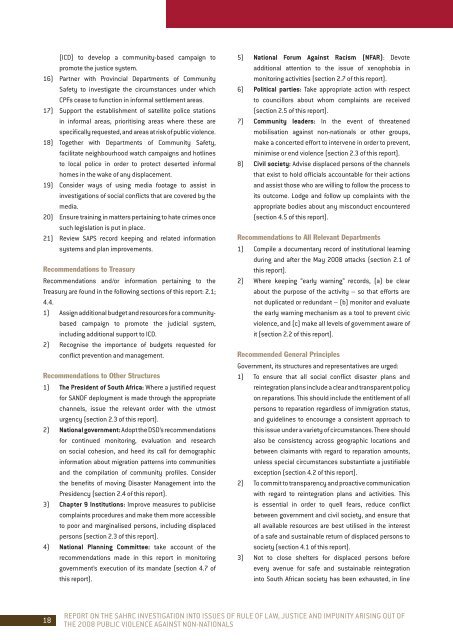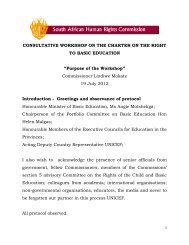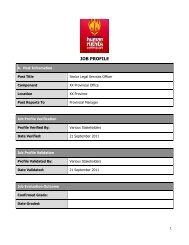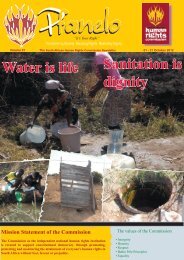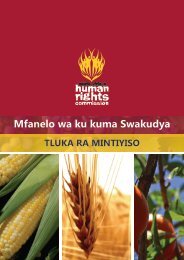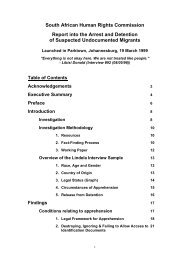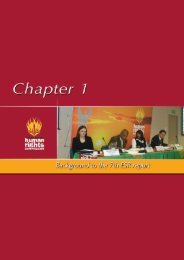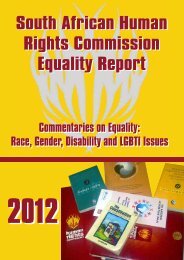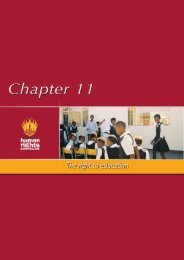Chapter 1 - South African Human Rights Commission
Chapter 1 - South African Human Rights Commission
Chapter 1 - South African Human Rights Commission
You also want an ePaper? Increase the reach of your titles
YUMPU automatically turns print PDFs into web optimized ePapers that Google loves.
(ICD) to develop a community-based campaign to<br />
promote the justice system.<br />
16) Partner with Provincial Departments of Community<br />
Safety to investigate the circumstances under which<br />
CPFs cease to function in informal settlement areas.<br />
17) Support the establishment of satellite police stations<br />
in informal areas, prioritising areas where these are<br />
specifically requested, and areas at risk of public violence.<br />
18) Together with Departments of Community Safety,<br />
facilitate neighbourhood watch campaigns and hotlines<br />
to local police in order to protect deserted informal<br />
homes in the wake of any displacement.<br />
19) Consider ways of using media footage to assist in<br />
investigations of social conflicts that are covered by the<br />
media.<br />
20) Ensure training in matters pertaining to hate crimes once<br />
such legislation is put in place.<br />
21) Review SAPS record keeping and related information<br />
systems and plan improvements.<br />
Recommendations to Treasury<br />
Recommendations and/or information pertaining to the<br />
Treasury are found in the following sections of this report: 2.1;<br />
4.4.<br />
1) Assign additional budget and resources for a communitybased<br />
campaign to promote the judicial system,<br />
including additional support to ICD.<br />
2) Recognise the importance of budgets requested for<br />
conflict prevention and management.<br />
Recommendations to Other Structures<br />
1) The President of <strong>South</strong> Africa: Where a justified request<br />
for SANDF deployment is made through the appropriate<br />
channels, issue the relevant order with the utmost<br />
urgency (section 2.3 of this report).<br />
2) National government: Adopt the DSD’s recommendations<br />
for continued monitoring, evaluation and research<br />
on social cohesion, and heed its call for demographic<br />
information about migration patterns into communities<br />
and the compilation of community profiles. Consider<br />
the benefits of moving Disaster Management into the<br />
Presidency (section 2.4 of this report).<br />
3) <strong>Chapter</strong> 9 Institutions: Improve measures to publicise<br />
complaints procedures and make them more accessible<br />
to poor and marginalised persons, including displaced<br />
persons (section 2.3 of this report).<br />
4) National Planning Committee: take account of the<br />
recommendations made in this report in monitoring<br />
government’s execution of its mandate (section 4.7 of<br />
this report).<br />
5) National Forum Against Racism (NFAR): Devote<br />
additional attention to the issue of xenophobia in<br />
monitoring activities (section 2.7 of this report).<br />
6) Political parties: Take appropriate action with respect<br />
to councillors about whom complaints are received<br />
(section 2.5 of this report).<br />
7) Community leaders: In the event of threatened<br />
mobilisation against non-nationals or other groups,<br />
make a concerted effort to intervene in order to prevent,<br />
minimise or end violence (section 2.3 of this report).<br />
8) Civil society: Advise displaced persons of the channels<br />
that exist to hold officials accountable for their actions<br />
and assist those who are willing to follow the process to<br />
its outcome. Lodge and follow up complaints with the<br />
appropriate bodies about any misconduct encountered<br />
(section 4.5 of this report).<br />
Recommendations to All Relevant Departments<br />
1) Compile a documentary record of institutional learning<br />
during and after the May 2008 attacks (section 2.1 of<br />
this report).<br />
2) Where keeping “early warning” records, (a) be clear<br />
about the purpose of the activity – so that efforts are<br />
not duplicated or redundant – (b) monitor and evaluate<br />
the early warning mechanism as a tool to prevent civic<br />
violence, and (c) make all levels of government aware of<br />
it (section 2.2 of this report).<br />
Recommended General Principles<br />
Government, its structures and representatives are urged:<br />
1) To ensure that all social conflict disaster plans and<br />
reintegration plans include a clear and transparent policy<br />
on reparations. This should include the entitlement of all<br />
persons to reparation regardless of immigration status,<br />
and guidelines to encourage a consistent approach to<br />
this issue under a variety of circumstances. There should<br />
also be consistency across geographic locations and<br />
between claimants with regard to reparation amounts,<br />
unless special circumstances substantiate a justifiable<br />
exception (section 4.2 of this report).<br />
2) To commit to transparency and proactive communication<br />
with regard to reintegration plans and activities. This<br />
is essential in order to quell fears, reduce conflict<br />
between government and civil society, and ensure that<br />
all available resources are best utilised in the interest<br />
of a safe and sustainable return of displaced persons to<br />
society (section 4.1 of this report).<br />
3) Not to close shelters for displaced persons before<br />
every avenue for safe and sustainable reintegration<br />
into <strong>South</strong> <strong>African</strong> society has been exhausted, in line<br />
18<br />
REPORT ON THE SAHRC INVESTIGATION INTO ISSUES OF RULE OF LAW, JUSTICE AND IMPUNITY ARISING OUT OF<br />
THE 2008 PUBLIC VIOLENCE AGAINST NON-NATIONALS


